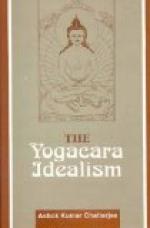|
This section contains 4,882 words (approx. 17 pages at 300 words per page) |

|
YOGĀCĀRA. The Yogācāra school is, with the Mādhyamika, one of the two main traditions of Indian Buddhism. As the name indicates (yogācāra means "one whose practice is yoga"), this school attaches importance to the religious practice of yoga as a means for attaining final emancipation from the bondage of the phenomenal world. The stages of yoga are systematically set forth in the treatises associated with this tradition. The particular doctrinal stance of the school is suggested by its alternate name, Vijñānavāda, or the "doctrine" (vāda) that all phenomenal existence is fabricated by "consciousness" (vijñāna).
In concert with those who uphold the doctrine of "voidness" (śūnyatā), the Vijñānavādins maintain that phenomenal existences are devoid of intrinsic nature, but unlike the Mādhyamika, they admit the reality of the...
|
This section contains 4,882 words (approx. 17 pages at 300 words per page) |

|


